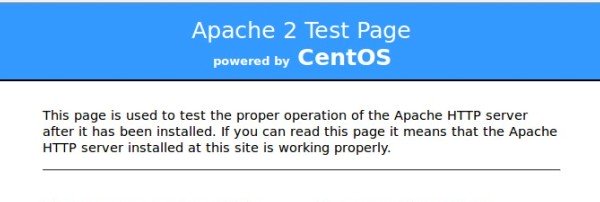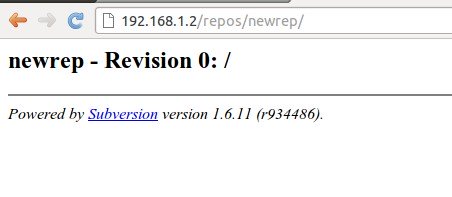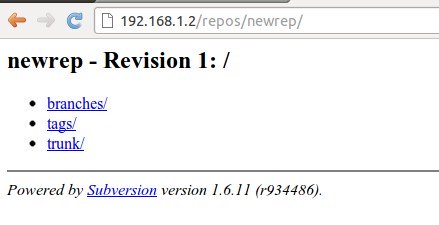SVN – Apache subversion
SVN – Subversion is a versioning and revision control system used by developers to track and keep up earlier versions of their source codes.
In this article we can see how to setup svn server on centos 6.
Lets start ,
Install svn server on centos 6
Update yum repositories and packages by typing the below command
[root@krizna ~]# yum update
Before installing SVN packages, you must install and configure apache ( Webserver ) .
Install and configure apache
Step 1 » Type the below command to install apache along with dependencies.
[root@krizna ~]# yum install httpd
Step 2 » Open the file /etc/httpd/conf/httpd.conf .
Find “#ServerName www.example.com:80″ (line no : 276 ) .
#
#ServerName www.example.com:80
and add this line below . “ServerName youripaddress:80″
#
#ServerName www.example.com:80
ServerName 192.168.1.2:80
Step 3 » Issue the below command to start apache service .
[root@krizna ~]# service httpd start
and type this below command to start apache service automatically while booting.
[root@krizna ~]# chkconfig --levels 235 httpd on
Now open your server ip address in the browser . you can see the apache test page.

If you not able to see the apache test page, Disable the firewall ( iptables ) and selinux service on your server .
Disable firewall ( Iptables ) »
[root@krizna ~]# service iptables stop
[root@krizna ~]# chkconfig iptables off
Disable Selinux » open the file /etc/selinux/config and find the line
SELINUX=enforcing
and replace with
SELINUX=disabled
now reboot the server and try again.
Install and configure svn server
Step 4 » Now start installing svn packages, Just type the below command .
[root@krizna ~]# yum install subversion mod_dav_svn
Step 5 » Now create new directory for svn repository.
[root@krizna ~]# mkdir /svn
Step 6 » Create a new repository in the svn by issuing the below command
[root@krizna ~]# svnadmin create /svn/newrep
Step 7 » Now issue the below commands one by one for necessary permissions.
[root@krizna ~]# chown -R apache.apache /svn/newrep/
[root@krizna ~]# chcon -h system_u:object_r:httpd_sys_content_t /svn/newrep/
[root@krizna ~]# chcon -R -h apache:object_r:httpd_sys_content_t /svn/newrep/
Step 8 » Now create a password file “newrep.users” with username “krizna” by typing below command
[root@krizna ~]# htpasswd -cm /svn/newrep.users krizna
Step 9 » Now open the SVN apache config file ( /etc/httpd/conf.d/subversion.conf ) and add the below lines at the end of the file .
<location /repos> DAV svn # SVN path SVNParentPath /svn AuthType Basic AuthName "Authorization Realm" #password file path AuthUserFile /svn/newrep.users Require valid-user </location>
Step 10 » Restart apache service
[root@krizna ~]# service httpd restart
Step 11 » Now open your svn path http://yourserverip/repos/newrep in a browser( Ex: http://192.168.1.2/repos/newrep ) . you can see newrep revision page after typing username and password created (step 8).

Step 12 » Create basic repository structure with the below commands
[root@krizna ~]# mkdir -p /tmp/svn/{trunk,branches,tags}
[root@krizna ~]# svn import -m 'Initializing basic repository structure' /tmp/svn/ http://localhost/repos/newrep/
Step 13 » Now you can see updated revision and structure details .
Enjoy ..


DON’T DISABLE YOUR FIREWALL AND SECURITY PROTECTION. Learn how to fix it, instead.
DON’T DISABLE YOUR FIREWALL AND SECURITY PROTECTION. Learn how to fix it, instead.
Hi, when type for the step 7 the result is this
chcon -h system_u:object_r:httpd_sys_content_t /svn/newrep/
chcon: failed to change context of «/svn/newrep/» to «system_u:object_r:httpd_sys_content_t»: Argumento inválido
what can I do?
Hi, when type for the step 7 the result is this
chcon -h system_u:object_r:httpd_sys_content_t /svn/newrep/
chcon: failed to change context of «/svn/newrep/» to «system_u:object_r:httpd_sys_content_t»: Argumento inválido
what can I do?
change your Selinux settings!
use “chcon -R –reference=/var/www/ /svn/newrep/” instead.
Authorization Required
This server could not verify that you
are authorized to access the document
requested. Either you supplied the wrong
credentials (e.g., bad password), or your
browser doesn’t understand how to supply
the credentials required.
Authorization Required
This server could not verify that you
are authorized to access the document
requested. Either you supplied the wrong
credentials (e.g., bad password), or your
browser doesn’t understand how to supply
the credentials required.
How I add more user. As of now wehn I am adding additional user using htpasswd -cm /svn/newrep.users krizna old one used to update with new onew user
htpasswd -m /svn/newrep.users krizna
Use command without c. c is used first time to create file.
How I add more user. As of now wehn I am adding additional user using htpasswd -cm /svn/newrep.users krizna old one used to update with new onew user
htpasswd -m /svn/newrep.users krizna
Use command without c. c is used first time to create file.
hi thanks for the information, Really appreciate you guys.
hi thanks for the information, Really appreciate you guys.
Hai Krizna,
nice post and very useful for me. But can you help me, if i want to create 1 user can manage more than one repository, what should i do in subversion.conf file? or any other way?
Many Thanks.
Hi , can you help me with this issue? I had done my task with your tutorial. Now, i create new repository newrep2. In last step, mkdir -p /tmp/svn/{trunk2,branches2,tags2} and
svn import -m ‘Initializing basic repository structure’ /tmp/svn/ http://localhost/repos/newrep2/. But it add all folder trunk2,branches2,tags2,trunk,branches,tags. I only want to it add trunk2,branches2,tags2
Cool bro. Its working amazingly. Wonderful narration. There is only one change in the subversion.conf location for centos 7 version. It is in /etc/httpd/conf.modules.d